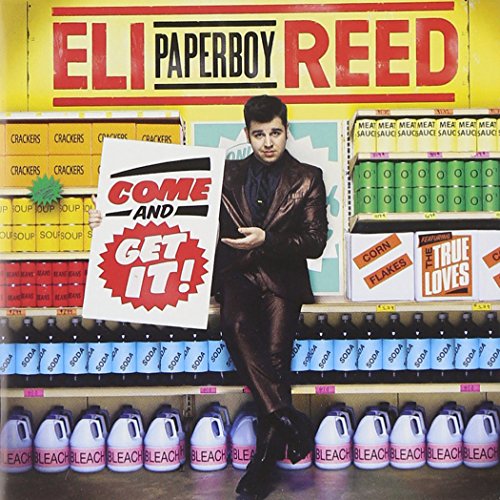
Eli "Paperboy" Reed
Come And Get It!
Release Date: Aug 10, 2010
Genre(s): R&B, Soul, Pop/Rock, Neo-Soul, Blue-Eyed Soul
Record label: Capitol
Music Critic Score
How the Music Critic Score works
Album Review: Come And Get It! by Eli "Paperboy" Reed
Fairly Good, Based on 6 Critics
Based on rating 8/10
Ever since the dawn of the electric guitar, white boys have sung the blues, some with considerably more success than others. Eli “Paperboy” Reed is part of that long tradition, but he stands apart from the pack as much as he belongs to it, due in large part to his age. Raised on CD reissues of classic blues and soul -- he was not even 10 when the first Complete Stax/Volt Singles box came out -- Reed has absorbed the sound and sensibility of classic ‘60s soul but sings without any white-boy blues affectations, totally comfortable in his own skin because nobody else his age, of any race, was attempting to make this kind of music.
Based on rating 78%%
Blue-eyed soul singer/guitarist Eli “Paperboy” Reed’s third offering and major label debut might finally earn him the mainstream success that has thus far eluded him. Heavy with swaggering, mood-laden rock and roll, guitar-strumming, and Reed’s soulful, albeit English vocal style, Come and Get It might be missing a certain kick, but it’s nevertheless intriguing. .
Based on rating 3.5/5
Following a pair of self-released albums that won him regional renown in his native Massachusetts, Eli “Paperboy” Reed and his ace backing band, the True Loves, make the jump to a major label with Come and Get It. For the uninitiated, the album may come across as something of a novelty at first, what with Reed’s gimmick being that of a young white kid singing and playing songs that sound like long-lost Stax and Motown sides. Once that initial impression wears off, Come and Get It succeeds because of Reed’s sincere affection for his chosen genre and his undeniable skill in performing it.
Based on rating 5/10
At 26 years old, Eli “Paperboy” Reed has already walked the path of soul crooners three times his own age. His resume is littered with references to mornings spent sweeping up after Gospel service up in Chicago and evenings spent grinding it out in Juke Joints down in the Mississippi Delta. If this kid told you he got himself around the country hopping train cars, you probably wouldn’t raise an eyebrow.
Based on rating 2/5
Amy Winehouse's Back to Black album was such a perfect simulacrum of 60s soul that it's easy to assume every blue-eyed soul singer to have followed was influenced by her sound and/or success. Boston's 26-year-old Eli "Paperboy" Reed may feel he has more of a connection to the source material – he moved to the Mississippi Delta as a teenager – but Come and Get It mines a similar vein of 1960s Stax records and early Motown. Everything here is expertly performed, and Reed has a raspy, yearning voice that recalls Wilson Pickett, or on the breathless Just Like Me, a rougher Marvin Gaye, but too much feels like soul by numbers.
Opinion: Excellent
He recalls the feel-good factor of the mid-1960s. Adrian Edwards 2010 On his third album, the US soul singer Eli “Paperboy” Reed proves he isn’t just a high-octane performer strutting his stuff on the dance scene, but a songwriter with a genuine flair for pastiche. In this collection of songs, largely self-penned, he recalls the feel-good factor of the mid-1960s in sentiment and tone: you can almost smell the slicked-back hair of Eli and his accompanying male vocal group as they schmooze their way through the slow burning ballad Pick a Number, or let rip with a an exuberant rock‘n’roller like Tell Me What I Wanna Hear.

